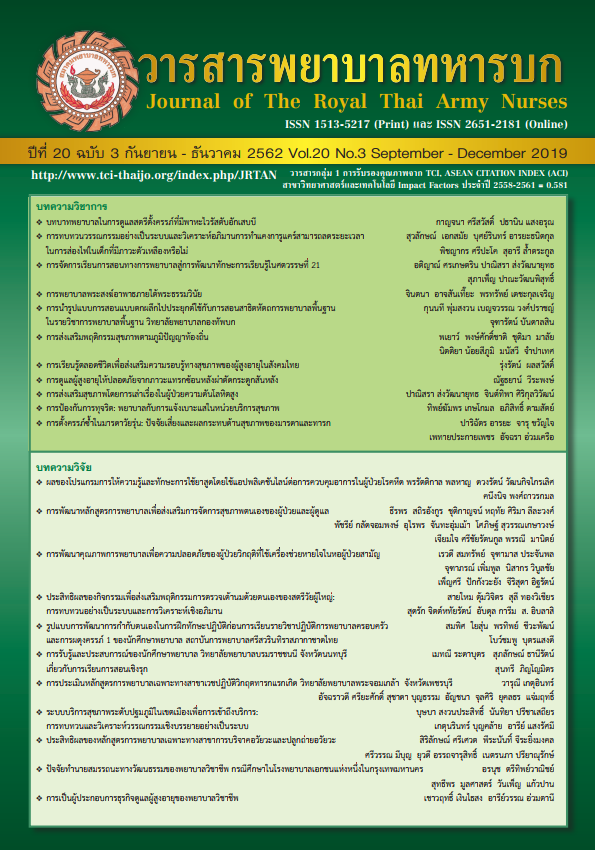Effects of Using Instructional Model Using Process of Group Teaching through Reflection to Enhance Academic Achievement and Critical Thinking Skills and Problem Solving for Nursing Students of The Royal Thai Army Nursing College
Keywords:
instructional module by using the process of group teaching through reflection, academic achievement, critical thinking, problem solvingAbstract
This quasi-experimental research aimed to compare the academic achievement of nursing students using pre-and post-test after applying the instructional module by using the process of group teaching through reflection. Additionally, this research aimed to compare the critical thinking and problem solving skills of nursing students by using the instructional model.,the purposive sampling method was used to recruit the sample, including 98 students from the 1st year of the Royal Thai Army Nursing College (RTANC). In addition, the academic achievement test and a form for measuring the critical thinking and problem solving skills were used to collect the data. The data, then, were analyzed by using percentage, mean, Standard Deviation (S.D.), and paired sample t-test statistics. This research found that the mean score of the pre-test of the academic achievement was 14.74 (S.D. 2.79), Whereas the mean score of the post-test of the academic achievement was 19.24 (S.D. 2.85). Importantly, the mean difference of the academic achievement between pre-and post-test of the students was statistically significant (P-valve 0.01). For the critical thinking and problem solving skills, The mean score of the pre-and post-test was 25.45 (S.D. 3.76), while the mean score of the post-test was 26.51. (S.D. 2.78). Also, the mean difference between the pre-and post-test of the critical thinking and problem solving skills was statistical significance (P-valve 0.01). It can be seen that using of the instructional model by applying the process of group teaching trough reflection can enhance the academic achievement and the critical thinking and problem solving skills of the RTANC nursing students, which could develop students’ learning skills in the 21st century.
Downloads
References
2. TachakupP.,&YindeesukP.Learning Management in the 21st Century. 4th ed. Bangkok: Chulalongkorn University Printing Press; 2016. (in thai).
3. Luebunthawatchai O. Critical thinking. Bangkok: Thapress and Graphic Co., Ltd.; 2000. (in thai).
4. Sherwood, G., Horton-Deutsch, S. Reflective Practice: Transforming Education and Improving Outcomes. 2nded. Indianapolis: Sigma Theta Tau International; 2012.
5. Edward SL. Critical thinking: a two-phase framework. Nurse education in Practice. 2006;7: 303-14.
6. Cirocco MM. How reflective practice improves nurse’ critical thinking ability. Gerontoenterological Nursing. 2007;30:405-13.
7. Wichainate K. Reflective Thinking: Teaching Students to Develop Critical Thinking in Nursing Practice. Journal of The Police Nurses. 2014;6:188-99. (in thai).
8. Nirotnant U. Short-term training course report. Development of teaching-learning competencies: Reflective thinking the university of north Carolina at chapel hill, School of Nursing, USA. College of Nursing. Bangkok: Boromarajonani
College of Nursing; 2016. (in thai).
9. Gibbs G. A guide to teaching and learning methods. Oxford Brookes University; 1998.
10. Wiyasurasing L.& Nuphuchinda S. The development of the teaching and learning model based on the learning philosophy that is consistent with the actual situation in order to create learning achievement and thinking ability. Reasonably for nursing students. Boromarajonani College of Nursing Journal of Nursing and Education. 011;4(3):63-71. (in thai).
11. Trenais S. Learning by Reflective Practice in Advanced Pediatric Nursing. Practicum: Experience and Learning Results of Graduate Nursing Students. Journal of The Royal Thai Army Nurses. 2014;15:378-85. (in thai).
12. Timmins F.,& Neill F. Reflection: An Audit of students use of Structured Model Within Specific Assessments. Procedia Social and Behavioral Sciences. 2013;93:1368-70.
13. Rojanaprasert P.,& Boonpiamsak T. The Effect of Computer-Assisted Instruction Lessons with Reflective Thinking Teaching in Nursing Care of the Child with Cardiac Catheterization on Knowledge and Critical Thinking among the Nursing Students. Thai Journal of CardioThoracic Nursing. 2013;24(2):16-28. (in thai).
14. Sinthuchai S.& Dejpituksirikul S. Reflective Practice in Nursing Education. Journal of The Royal Thai Army Nurses. 2018;19(2):15-23. (in thai).
15. Rattanasuwan W. Development of training courses to develop reflective thinking ability of nursing instructors. Ph.D., Doctor of Education. Educational Administration, Faculty of Education, Srinakharinwirot University. 2004. (in thai).
16. Thana K.& Nittayawan S. Mccormick Stusent Nurses’ Satisfaction Thru Reflective Learning in Fundamental Nursing Practice (SN. 281), Semester 2, Acadamic Year 2012-2013. Payap University.
17. Khiaolueang D, Kaewurai W, Hingkanon P, & Viboonrangsun S. The Development of the Thought Reflection Learning Model to Enhance Ethical Decision-Making in Nursing for Student Nurses. Journal of Education Naresuan University. 2013;15(4): 9-21. (in thai).
18. Na Nakorn P.The Study of Learning Management through Reflection for Developing a Critical Thinking Process in Nursing Students. Ramathibodi Nursing Journal. 2016;22:206-21. (in thai).
19. Shields, E. Reflection and learning in student nurses. Nurse Education Today. 1995;15: 452-58.
20. Wisanskoonwong P., & Sawangtook S. Learning through Reflective Practice of Nursing Students in the Delivery Room: A Qualitative Research. Kuakarun Journal of Nursing. 2015;22:57-70. (in thai).
Downloads
Published
How to Cite
Issue
Section
License
บทความหรือข้อคิดเห็นใดใดที่ปรากฏในวารสารพยาบาลทหารบกเป็นวรรณกรรมของผู้เขียน ซึ่งบรรณาธิการหรือสมาคมพยาบาลทหารบก ไม่จำเป็นต้องเห็นด้วย
บทความที่ได้รับการตีพิมพ์เป็นลิขสิทธิ์ของวารสารพยาบาลทหารบก
The ideas and opinions expressed in the Journal of The Royal Thai Army Nurses are those of the authors and not necessarily those
of the editor or Royal Thai Army Nurses Association.






